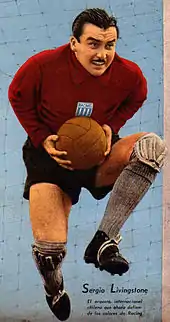Sergio Livingstone
Serjio Robert Livingstone Pohlhammer (26 March 1920 – 11 September 2012), later simply known as Sergio Livingstone, was a Chilean goalkeeper, who later became a well-regarded journalist. He was nicknamed "El Sapo" ("the toad") for his typical posture in the goal. From 1938 to 1959 he played primarily for CD Universidad Católica in Santiago. With Chile he took part in seven Copa América and one FIFA World Cup.
 Livingstone, wearing the national jersey | |||
| Personal information | |||
|---|---|---|---|
| Full name | Sergio Roberto Livingstone Pohlhammer[1][2][3] | ||
| Date of birth | 26 March 1920 | ||
| Place of birth | Santiago, Chile | ||
| Date of death | 11 September 2012 (aged 92) | ||
| Place of death | Santiago, Chile | ||
| Height | 1.81 m (5 ft 11 in) | ||
| Position(s) | Goalkeeper | ||
| Youth career | |||
| 1936–1937 | Unión Española | ||
| Senior career* | |||
| Years | Team | Apps | (Gls) |
| 1938–1942 | Universidad Católica | ? | (?) |
| 1943 | Racing Club | 30 | (0) |
| 1944–1956 | Universidad Católica | ? | (?) |
| 1957 | Colo-Colo | ? | (?) |
| 1958–1959 | Universidad Católica | ? | (?) |
| International career | |||
| 1941–1954 | Chile | 52 | (0) |
| *Club domestic league appearances and goals, correct as of September 2008 | |||
Career
Serjio (later Sergio) Livingstone's family hailed from Scotland. His father John Livingstone Eves, who played for Santiago National, was a pioneer of the game in Chile and his mother, Ana Pohlhammer Caamaño, died when Sergio was 11 years old.[4] Livingstone originally joined Unión Española in 1936, after Luis Tirado watched him in a match between St. Ignatius College, where he studied, and English Institute of Santiago.[4] He abandoned football to study law at the Pontificia Universidad Católica de Chile. Soon he acquainted himself with the university's football team, and from 1938 he began to establish himself as the goalkeeper of CD Universidad Católica.

He debuted in the national team at the 1941 South American Championship which took place in Chile, winning 5–0 against Ecuador. By the end of the tournament Chile ended third, and Livingstone was considered the best player of the tournament. Altogether, Livingstone played between 1941 and 1954 in 52 matches for Chile,[5] which made him the country's record international until 1962, participating in five more South American Championships, totaling 34 matches in this competition, which remains record. He also took part in the FIFA World Cup 1950 in Brazil, where Chile exited after the first group phase.
At club level he spent 1943 in Argentina playing 30 matches for Racing Club. He cut short his time in Argentina for sentimental reasons and rejoined Católica in 1944, winning the national championships of 1949 and 1954. After the second title the club had the misfortune to be relegated in the season immediately thereafter, but managed to return to the first division as quickly. After a brief spell on loan in 1957 with Colo-Colo he once more returned to Universidad Católica where he finished his career in 1959. Following his football career, he became a well-known sports journalist and television personality with Televisión Nacional de Chile, where he remained until his death (more than 60 years).[6]
Legacy
In 2009, a street in the district of Independencia in Santiago was named for Livingstone.
Honours
- Championship of Chile: 1949, 1954
References
- "CERTIFICADO DE NACIMIENTO" (PDF). Servicio de Registro Civil e Identificación de Chile. 11 September 2012. Retrieved 11 September 2012.
- "PADRON ELECTORAL AUDITADO – ELECCIONES MUNICIPALES 2012 – COMUNA: VITACURA" (PDF). Servicio Electoral de Chile. 19 August 2012. p. 580. Archived from the original (PDF) on 1 September 2012. Retrieved 11 September 2012.
- Radnic, F., Marietta (26 May 2011). "Nada me aburré, nunca me canso". El Mercurio. Retrieved 11 September 2012.
- "Sergio Livingstone (1920-2012)". www.memoriachilena.gob.cl (in Spanish). Retrieved 27 July 2022.
- Roberto Mamrud. Chilean Record International Players 19 February 2010, RSSSF
- S.A.P., El Mercurio (11 September 2012). "Sergio Livingstone: El ex futbolista que llegó a lo más alto de la TV y el periodismo deportivo | Emol.com". Emol (in Spanish). Retrieved 31 August 2018.
External links
- Sergio Livingstone – FIFA competition record (archived)
- Claudio Pizarro: "Sergio 'Sapo' Livingstone, un crack de 89 años: "Si jugara ahora, sería farandulero", 18 September 2009, The Clinic
- Jorge Guerrero Cortés: El libro no escrito de Sergio Livingstone 4 June 2010, DOREMIFAGOL